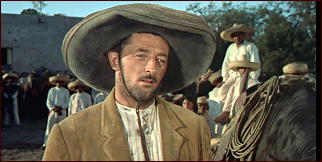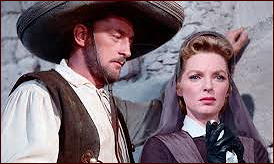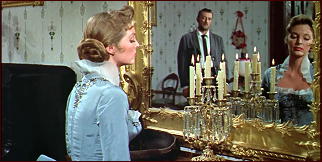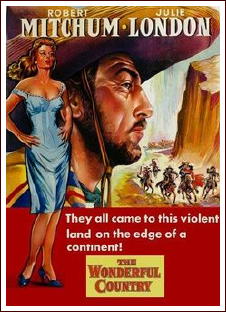Sat 9 Jul 2016
A Western Book! Movie!! Review by Dan Stumpf: TOM LEA – The Wonderful Country.
Posted by Steve under Reviews , Western Fiction , Western movies[3] Comments
TOM LEA – The Wonderful Country. Little Brown, hardcover, 1952. Bantam Giant, paperback, A1190, 1954. Reprinted many times since.
THE WONDERFUL COUNTRY. DRM Productions/United Artists, 1959. Robert Mitchum, Julie London, Gary Merrill, Albert Dekker, Pedro Armendariz, Jack Oakie, Charles McGraw, Leroy “Satchel†Paige, Victor Mendoza, Chuck Roberson and Chester Hayes. Screenplay by Robert Ardrey, based on the novel by Tom Lea. Directed by Robert Parrish.
One of those instances where seeing the movie prompted me to read the book, which I found very different but just as fine.
As the novel starts, Martin Brady enters the story as an unlucky rider who breaks a leg while on a gun-running errand in a Texas border town. As he spends months recovering, surrounded by curious townspeople and shifty business associates, we learn that when he was a boy of fourteen in Missouri he murdered the man who killed his father and fled to Mexico where he has made his living for the last fifteen years as a pistolero for a wealthy Mexican land-owner.
We also learn about the citizens of the town and the soldiers at the nearby Army Outpost: Gruff & thoughtful Doc Stovall who sets Brady’s leg; Major Colton, the new Post Commander and his tearful, unhappy wife; Captain Rucker of the Texas Rangers and his fiercely loyal men; the shopkeepers and soldiers in and around the town…. Lea takes time to evoke them all but manages it without slowing his story down.
Ah yes, the story: As Brady recovers he finds himself growing closer to the community. It seems no one is interested in the unsolved murder of a no-good years ago in Missouri. The townspeople are warming to him, and Captain Rucker would like to recruit a man who knows Mexico and can speak the language. Brady seems set to rejoin the human race…. until he kills a man in a fight and has to flee back south of the border again where more grief awaits him till he can find a way back into humanity.

Lea has his own unique way of recounting Brady’s labors as a hired pistolero; he gives us the expected bursts of terse action, quite well handled, but what he concentrates on is the ordinary unglamorous hardship of getting around in a hostile land. He makes us feel the heat, the cold and the ache in your bones crawling through wet grass on a cold night, or the saddle-soreness of long, long rides and the gritty business of pursuing and fighting hostile Apaches, lending a tactile realism to things most Western writers just ignore. He also does a skillful job of keeping his bad guys off-stage, lowering like clouds gathering at the edge of the story, then thundering in for a torrential impact. The result is a book I’ll come back to again.

They couldn’t capture all of this in the movie; the film is set in that perpetual sunny Summer that seems a staple of the Western; characters are changed around, the plot is simplified, but The Wonderful Country is a film to treasure.
Robert Mitchum, a great actor who phoned it in too often, gives himself fully to the part of Martin Brady: scruffy and unshaven for most of the movie, he evokes that kicked-around look he did so well in Out of the Past, combined with the leathery toughness you need in a Western.
He’s supplemented with a worthy cast. The movie doesn’t have time to for all the personal details in the novel, but makes up for it with sharp performances from memorable actors.

Charles McGraw evokes Doc Stovall in a few telling lines and gestures; Pedro Armendariz and Jack Oakie strut their arrogance and cupidity; Albert Dekker, Satchel Paige and Gary Merrill make tough fighting men, and even bit players like Chuck Roberson and Victor Mendoza (both as local bullies) stay in the memory long after their brief time on screen has flashed by. And the nasties kept off-page in the book are given a few memorably menacing shots early in the film so they seem to come out of the story naturally when it’s time to bring them on.
Best of all is Julie London as the unhappy officer’s wife. No tears for her, though; Julie plays it with a sexy toughness that seems to bubble up out of the Texas heat and spread across the screen. Add to that a manner of frank self-appraisal, and we get a characterization of unusual depth and a few surprises.
Director Parrish handles the action well enough, but this is basically a film about the characters. And it’s a memorable one.

July 9th, 2016 at 3:39 pm
Haven’t read the book, but I agree this film is a treasure. I didn’t expect Mitchum to fit in well with this role, but he did, which was impressive.
July 9th, 2016 at 4:21 pm
I’d want to see this just for Satchel Paige.
July 10th, 2016 at 4:45 am
I agree both on book and film, and don’t forget the memorable illustrations from the book. Lea was a noted illustrator before he turned to writing and this and THE BRAVE BULLS are memorably illustrated.
I’ve always thought of this as what a Western written by Hemingway might be like.